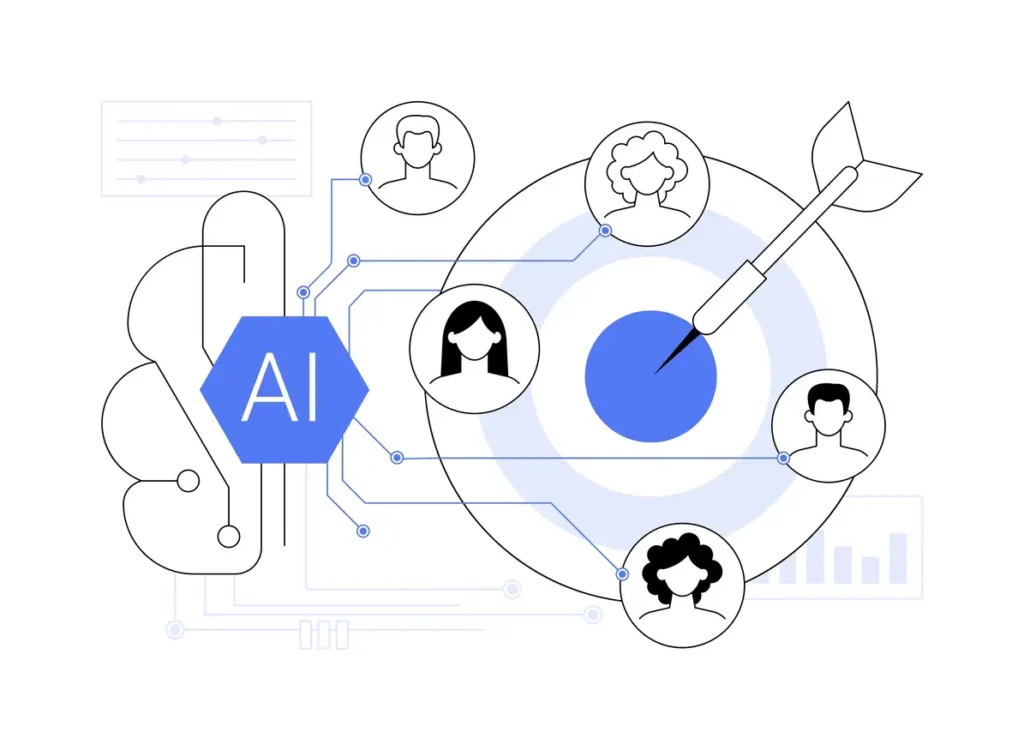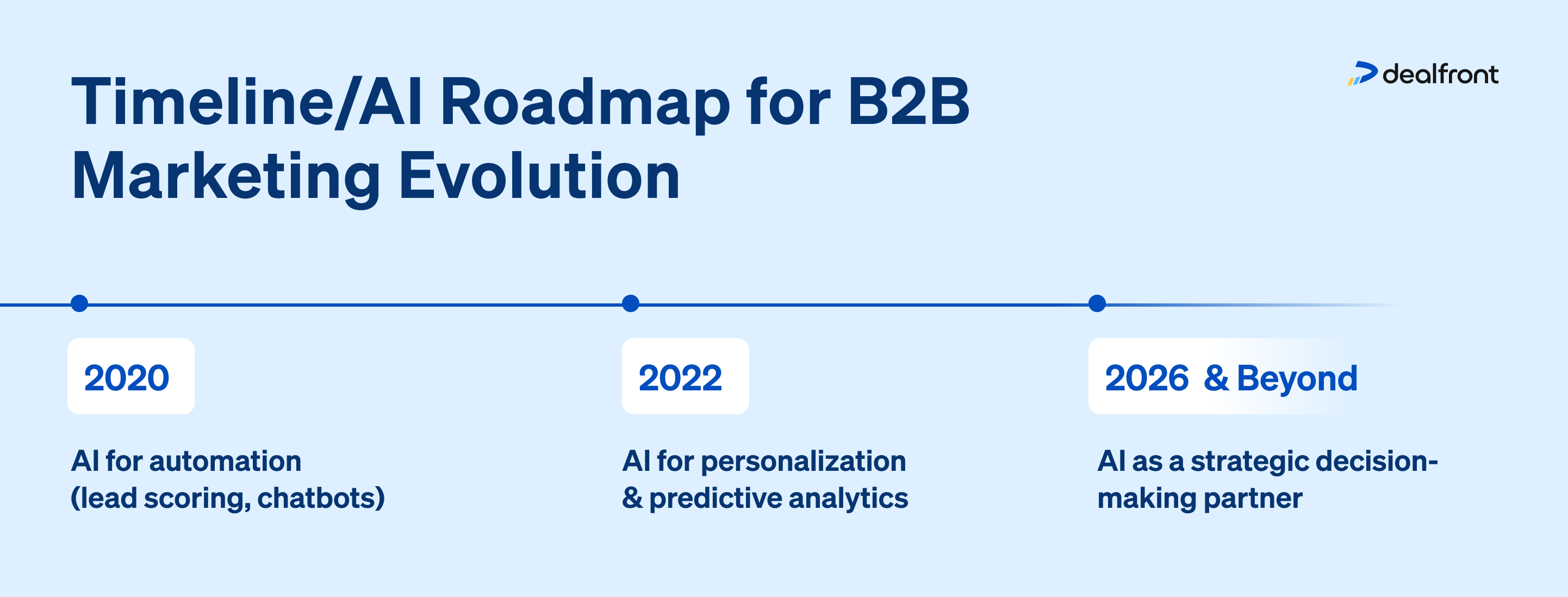Top benefits of Growth Systems For B2B for B2B customer engagement
Wiki Article
Open Effectiveness and Development With AI Automation for B2B Business
AI automation is transforming the landscape for B2B business. It decreases and simplifies procedures reliance on human treatment. This change permits companies to make quicker, data-driven choices. As organizations explore which refines to automate, they need to additionally think about the right devices to execute. Nevertheless, difficulties continue to be in embracing AI innovation. The ramifications of these modifications could shape the future of numerous companies in means yet to be completely comprehended.Recognizing AI Automation in the B2B Context
As services significantly look for effectiveness, comprehending AI automation in the B2B context ends up being important. AI automation entails utilizing advanced innovations to improve procedures, decrease human intervention, and enhance decision-making procedures. In the B2B landscape, this can show up in different kinds, such as automating client solution communications, managing supply chain logistics, or maximizing advertising campaigns. Business can take advantage of AI to assess large datasets quickly, enabling them to determine fads and understandings that inform critical selections. AI systems can integrate effortlessly with existing technologies, providing a natural platform for handling business features. This understanding prepares for companies to check out exactly how AI can transform their operations, improve efficiency, and inevitably foster sustainable development in an affordable market.Trick Benefits of Implementing AI Automation

Determining Procedures Ideal for Automation
Exactly how can B2B companies successfully identify procedures suitable for automation? An organized method starts with drawing up existing process to identify repeated and lengthy jobs. These tasks frequently consist of data entry, invoicing, and consumer follow-ups. Companies must examine the regularity and quantity of these processes, as high-frequency tasks offer the greatest possibility for performance gains. Additionally, examining the possibility for mistake decrease and resource allotment can highlight areas ripe for automation. Engaging staff members in discussions can additionally offer understandings into which procedures impede productivity. Lastly, firms need to take into consideration the positioning of automation with their calculated goals, making certain that the recognized processes add to total company goals, inevitably facilitating smoother operations and improved development.
Selecting the Right AI Tools for Your Service
When B2B companies take into consideration automating their procedures, choosing the ideal AI tools becomes important for accomplishing desired end results. Business ought to begin by examining their one-of-a-kind demands and purposes, ensuring placement with service objectives. Examining the flexibility, assimilation, and scalability capabilities of prospective tools is essential, as these factors determine lasting efficiency (B2B Automation Consulting). Organizations should likewise take into consideration user-friendliness and the degree of assistance given by vendors, as these elements can influence effective application. Additionally, evaluating customer reviews and situation researches can provide insights right into exactly how particular AI options perform in real-world circumstances. By carefully picking AI tools that fit their functional demands, B2B firms can enhance effectiveness and drive development while decreasing possible interruptionsConquering Challenges in AI Fostering
B2B companies usually encounter significant challenges in adopting AI technologies, particularly issues associated to data high quality and resistance to change administration. Poor data quality can hinder the effectiveness of AI systems, while worker unwillingness to embrace new processes can stall implementation initiatives. Attending to these obstacles is necessary for successful AI combination and maximizing its possible benefits.Information Quality Issues
Assuring high information quality is important for the successful fostering of AI technologies in business-to-business environments. Incorrect, insufficient, or outdated information can severely hinder AI campaigns, resulting in incorrect insights and inadequate decision-making. Companies frequently face obstacles such as information silos, variances across various sources, and a lack of standard information layouts. To get over these problems, organizations need to invest in data cleansing, integration, and administration processes (Growth Systems For B2B). Applying robust data administration methods assures that the information fed right into AI systems is relevant and trustworthy. Furthermore, cultivating a society of data high quality understanding amongst employees can boost data precision in time. By addressing data quality problems, B2B companies can release the complete possibility of AI automation, driving efficiency and growthAdjustment Monitoring Resistance
Overcoming adjustment administration resistance is crucial for the successful execution of AI efforts within companies. Staff members typically exhibit uncertainty towards AI, being afraid task variation or modifications to recognized process. To fight this, management has to promote a society of visibility and constant learning. Offering training and clear communication concerning the advantages of AI can build and ease problems trust. Engaging staff members in the shift process encourages collaboration and minimizes resistance. Additionally, identifying change champs within teams can assist in smoother acceptance of AI technologies. As organizations browse this transformation, resolving emotional and functional worries connected to AI adoption becomes important for optimizing the modern technology's potential and making certain a seamless integration into existing processes.Gauging the Effect of AI Automation
Determining the impact of AI automation in B2B business requires a clear understanding of essential efficiency indicators (KPIs) that line up with service objectives. Reliable data evaluation methods are crucial for interpreting the outcomes, while durable ROI evaluation strategies aid figure out the monetary benefits of automation initiatives. With each other, these components offer a substantial framework for reviewing AI's contributions to organizational success.Trick Efficiency Indicators
Secret performance signs (KPIs) work as vital devices for B2B firms to evaluate the performance of AI automation campaigns. By establishing clear metrics, companies can determine improvements in operational efficiency, cost reduction, and earnings development directly attributable to automation. Common KPIs consist of cycle time decrease, mistake prices, client contentment ratings, and worker efficiency degrees. These signs give insights into exactly how AI systems are optimizing processes and improving general performance. In addition, tracking KPIs makes it possible for companies to identify areas for additional renovation and to line up AI automation initiatives with tactical service goals. Ultimately, a well-defined structure of KPIs assurances that B2B companies can quantitatively examine the influence of AI automation on their procedures and drive constant growth.Information Evaluation Methods
Reliable data analysis techniques play an essential duty in reviewing the impact of AI automation within B2B companies. By using analytical methods, organizations can identify trends and patterns in functional data, permitting them to assess the efficiency obtains achieved via automation. Techniques such as regression analysis and time collection projecting provide understandings into just how AI-driven procedures affect productivity and decision-making. Minarik AI. In addition, information visualization devices can efficiently connect findings to stakeholders, promoting notified calculated decisions. Artificial intelligence algorithms can additionally improve evaluation by anticipating future end results based on historic data, offering workable understandings. Ultimately, these techniques enable B2B business to determine success and enhance their AI automation campaigns, making sure placement with business purposes and improving total performanceROI Analysis Techniques
Examining the roi (ROI) of AI automation is crucial for B2B companies looking for to recognize the financial ramifications of their technical initiatives. Companies can utilize various ROI assessment methods to gauge the effectiveness of AI implementations. One effective strategy includes determining cost savings by contrasting operational expenses prior to and after automation. In addition, gauging productivity improvements with key efficiency indications (KPIs) assists evaluate the advantages of AI. Customer contentment metrics can likewise supply understandings right into the impact of automation on service top quality. To guarantee a comprehensive analysis, business need to take into consideration both direct intangible benefits and monetary returns, such as improved decision-making capacities and competitive benefit. This complex examination enables B2B companies to make educated decisions relating to future investments in AI innovation.Future Trends in AI Automation for B2B Firms
What innovations exist ahead for AI automation in B2B business? Emerging trends indicate a substantial change towards enhanced information analytics capabilities, allowing organizations to make even more enlightened choices (AI Automation For B2B). Anticipating analytics will certainly become increasingly important, permitting companies to anticipate market adjustments and client requirements. Additionally, the assimilation of AI with Net of Points (IoT) technology is expected to streamline operations by giving real-time insights and automation of processes. Companies will additionally concentrate on boosting client experiences with individualized advertising and marketing driven by AI formulas. Improvements in all-natural language handling will help with far better communication in between clients and companies. As these trends progress, B2B companies must adjust to utilize AI automation efficiently, ensuring continual development and competitive advantageFrequently Asked Inquiries
What Industries Advantage one of the most From AI Automation in B2B?
Manufacturing, finance, health care, and logistics industries profit the most from AI automation in B2B. These fields utilize AI to optimize procedures, enhance decision-making, and enhance general functional efficiency, driving considerable growth and technology.How Does AI Automation Effect Worker Roles and Responsibilities?
AI automation improves employee roles and obligations by streamlining repetitive tasks, making it possible for workers to concentrate on tactical initiatives. This shift promotes skill development, enhances productivity, and urges cooperation, inevitably driving organizational development and technology.What Prevail False Impressions Regarding AI Automation in B2B?
Common false impressions about AI automation in B2B include worries of work loss, beliefs that AI can fully replace human judgment, and taking too lightly the relevance of collaboration in between AI systems and staff members for ideal outcomes. - Minarik AIHow Can Organizations Guarantee Information Personal Privacy With AI Automation?
Companies can guarantee data privacy with AI automation by executing robust security protocols, sticking to governing compliance, conducting normal audits, and training staff members on data managing practices to minimize threats and shield delicate info. (Growth Systems For B2B)What Are the Expenses Related To Implementing AI Automation?
The expenses related to executing AI automation consist of software purchase, framework upgrades, training employees, continuous maintenance, and possible downtime during combination. In addition, firms might incur expenses related to information safety and security and conformity procedures.Determining the influence of AI automation in B2B business calls for a clear understanding of crucial efficiency indications (KPIs) that align with business goals. Trick performance indicators (KPIs) serve as important tools for B2B firms to examine the performance of AI automation campaigns. Effective information evaluation strategies play an essential function in examining the effect of AI automation within B2B business. Reviewing the return on financial investment (ROI) of AI automation is necessary for B2B business looking for to recognize the monetary ramifications of their technical campaigns. What technologies lie ahead for AI more automation in B2B firms?
Report this wiki page